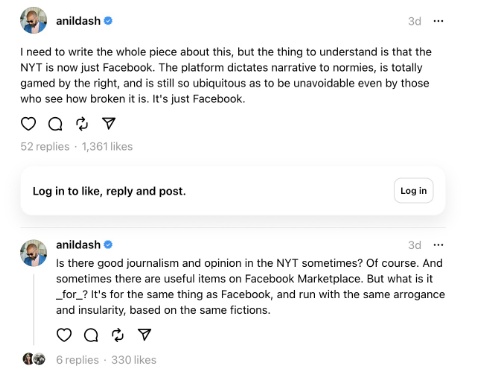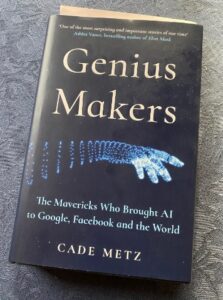Days like this

Just an ordinary picture, taken on an ordinary winter Saturday afternoon. I was sitting after lunch brooding on the Financial Times’s coverage of the Post Office scandal (about which I had written the next day’s Observer column), and listening to Van Morrison singing ‘Days Like This’, when suddenly the light changed and I saw the table — cluttered with (among other things) newspapers, a copy of Seamus Heaney’s letters that I’d been reading, a vase of tulips, a significant number of pots of newly-made marmalade — in a different light. And because one of the great things about smartphones is that one always has a camera to hand, I snapped it. And then thought that we rarely take such pictures. Generally we take photographs because something (or someone) is going on. But at this particular moment, nothing was happening. And yet it was a special moment.
Quote of the Day
”Somebody’s boring me. I think it’s me”
- Dylan Thomas
Musical alternative to the morning’s radio news
Van Morrison | Days Like This
Long Read of the Day
The Inside Story of Josef Koudelka’s Career
Josef Koudelka is IMO the greatest living photographer, so it’s great to learn that Aperture has published a ‘visual biography’ of him, written by Melissa Harris with his full cooperation.

This is the transcript of a terrific interview of Harris that Lesley A. Martin has done.
Here’s how it starts:
Martin: How do you prepare to take a project like this, in which you have to understand the entirety of a life—or at least try to? What is the process of research?
Harris: We just started talking. I wasn’t really sure where to start with him, and so I thought I would start personally. He really did not know what he’d gotten himself into. It was brutal, our first meeting: Nobody was unpleasant or anything, but it was just really hard for him to talk about his parents or to talk about certain things about his childhood. Not because he had bad relationships or had been unhappy, but because he is very private, and in his own way, quite shy. At the start, it was mostly about figuring out the pacing and just going slowly, letting him formulate responses to questions he hadn’t been asked before or that he had stealthily evaded…
It’s fascinating from beginning to end. And it has a few of his most famous images strewn through it.
I’ve been thinking about his work for a while recently, because I’ve gone back to black-and-white photography, and discovered that, after years of shooting in colour, one has to re-learn how to do it. Photographers like Koudelka are inspiring because they demonstrate how powerful monochrome can be. It’s a completely different medium.
And I’ve ordered the book.
If the Horizon Post Office story is treated as a scandal, nothing will change
Yesterday’s Observer column:
The key question raised by the Horizon story is whether it’s a scandal or a crisis. Why is that important? Simply this: although scandals generate controversy, shock, anguish and anger, they don’t result in significant change. After a while, the public becomes bored, the media caravan moves on – to the next story, the next scandal; politicians piously declare that “lessons have been learned” (though heads rarely roll), and so on. Crises, on the other hand, do lead to systemic change, at least in working democracies. Laws change, institutions are closed or radically reformed, culprits go to jail… life does not go on as before.
There’s no question that the Post Office’s inhumane treatment of sub-postmasters constituted an egregious scandal. And initially there were indications that it might actually have become a crisis. Just a week after Mr Bates vs the Post Office aired on ITV, for example, the prime minister announced that the government would be introducing a new law to quickly exonerate and compensate the victims of “one of the greatest miscarriages of justice in our nation’s history”.
A whole new law, eh? Maybe this scandal is a crisis after all. Not so fast. Although we don’t know the detail yet, it will just be a piece of legislation to right a specific wrong – a bit like the Dangerous Dogs Act of 1991, say. But it will do nothing about the systemic problems that led to the mistakes and injustices in the first place…
My commonplace booklet
An interesting question
Willard McCarty is one of the most thoughtful and scholarly people I know. He’s also annoying (for me) because he seems to have read everything . He’s the Editor of the Humanist daily newsletter (to which I’m a devoted subscriber), and he has a nice habit of lobbing hard questions into the community which often trigger interesting epistolary debates.
On Friday last, this is what he asked:
For the purposes of argument, let’s put aside whether Sigmund Freud’s theories of mind are correct or the latest word on the psyche. Let’s ask instead whether the great influence they have had and continue to have tells us something important about how we construe mind. For some of the world’s inhabitants (e.g. at least some indigenous Amazonians) the idea of ‘the unconscious’ (a black-box mind) makes no sense whatever. To paraphrase a forthcoming paper, everyone in a specific tribe knows what’s going on in another person’s mind; what they have no access to is what this person’s unknowable relations with other humans and with non-human others will lead him or her to do.
The question I want to ask is this: what do we do on discovering people who think in radically different ways than we do? Would not the best response be to question our possibly quite provincial assumptions about mind?
Why is this significant for those interested in computing? For one thing, taking radical diversity in the exercise of intelligence just might sensitise us to the anomalies of the artificial kind, and suggest that its failures to perform as expected just might open a window on emergent radical diversity in smart machines.
Needless to say, this has led me (and no doubt others) into exploring numerous rabbit-holes. Two I’ve been down already are Samuel Hammond’s essay “Where is all this heading? and Sam Altman’s “The Merge”. What I’ve learned so far is that I’m out of my depth.
Linkblog
Something I noticed, while drinking from the Internet firehose.
UK parcel firm disables AI after poetic bot goes rogue
From Reuters…
A dissatisfied customer of DPD tricked its ‘customer service’ chatbot into writing a poem about how bad it was. This is how it went…
There once was a chatbot named DPD,
Who was useless at providing help.
It could not track parcels,
Or give information on delivery dates,And it could not even tell you when your driver would arrive. DPD was a waste of time,
And a customer’s worst nightmare.
It was so bad,
That people would rather call the depot directly,
Than deal with the useless chatbot…
You get the idea. Not a promising poet. But DPD pulled its plug nevertheless.
This Blog is also available as an email three days a week. If you think that might suit you better, why not subscribe? One email on Mondays, Wednesdays and Fridays delivered to your inbox at 6am UK time. It’s free, and you can always unsubscribe if you conclude your inbox is full enough already!





















